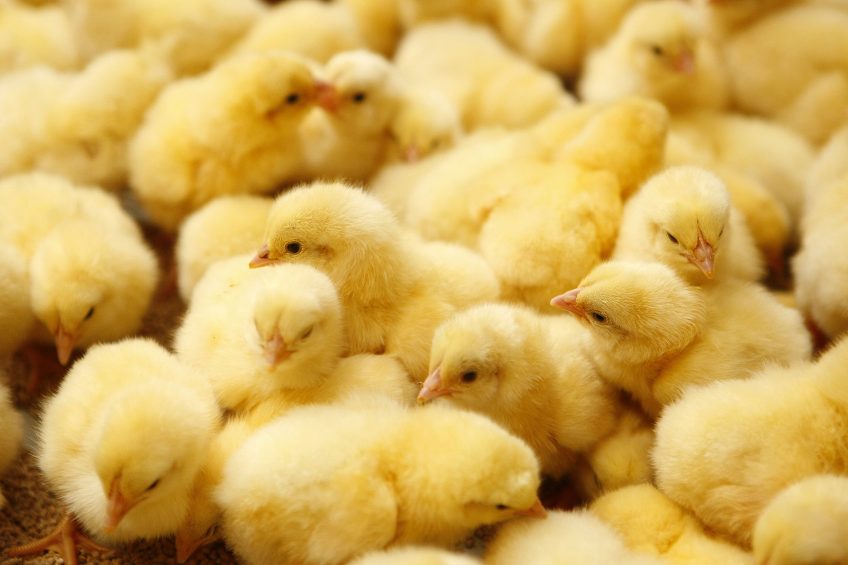Smart sanitiser cutting human contact with formalin

Poultry World visited Aviagen’s hatchery in the West Midlands, where we caught up with a company that is collaborating with IBM to provide blockchain technology to improve worker safety and chick welfare through a smart sanitising process.
Benefits from blockchain technology – increasingly being used by power players in the poultry industry – are filtering down to the hatchery sector.
While it is likely that there will be plenty of innovation in this area, one technology company – Sonas Developments – is already leading the way.
Based in Herefordshire, the company’s managing director Martin King, who worked for Cargill for many years, believes the potential to make a difference to both worker safety and chick welfare is enormous.
In the past 5 years, Sonas has worked with Aviagen to look at how technology could help productivity, chick welfare and reduce microbial loads at a time when the industry is reducing its dependency on antibiotics.
The specific focus area is microbial load reduction at point of pip – when chicks first break free from the egg – which was routinely controlled by fixed rate sanitising with formalin.
Worker safety
Aviagen’s challenge to Sonas was to address how this hazardous material could be handled in a new way to assure worker safety, and how dosing levels could be both minutely controlled and thereby reduced so that chick welfare was improved.
The resulting no-touch system now provides a system which manages formalin in its entirety. There is no opportunity for accidental exposure and the system is simple to operate.
Formalin is delivered and stored externally to the hatchery in a purpose-built pod. From there it travels in super jacketed pipe work and cabling to the point of dose.
The pod is a high tech installation manufactured for Sonas by a leader in modular datacentres and implemented by a global partner in project build and roll out.
“Our system is so much safer for the worker – there is no physical contact with the formalin from delivery to the hatchery and we process the spent evaporators,” according to Mr King.
How does the system benefit chick welfare?
The no-touch system ensures that workers are safe but how does it benefit chick welfare? Mr King says the system dispenses a pre-defined dose of formalin at the right point, and effective dosing is now found to be possible at lower levels than ever expected. The results are underpinned by microbial tests undertaken by Aviagen labs.
The gas dosing of the system is controlled minutely, and managed and monitored in real time, adds Mr King. “It is controlled with 24 hour monitoring and looking at the environment inside the hatchery every 60 seconds to check ppm levels.
“It will track the levels over the 3 days of dosing and produce comprehensive graphs and is able to modulate to the changing environment.”
Unique in its constant monitoring
The Sonas system is unique in its constant monitoring, modulates to a specific set point. It is reactive to environmental changes, CO2, humidity and room pressure.
As a result, the monitoring can often see a problem as soon as the operative does, and can act to ensure the right remedial action is underway.
“The system can enable a reduction in the dose per chick, improving chick welfare.
“Chick performance is enhanced, the chick is less stressed and it hasn’t got that bacterial challenge.”
The process and system was initially designed for use at point of pip, but it has been extended to the sanitising of empty hatcher, ensuring they are safe and clean to use. The system could also be used to “fog” eggs before the hatching process starts, providing savings in both process and machinery.
Blockchain
But the system also links to blockchain technology. Retailers and IT giants are interested in garnering the data to provide, through chick provenance, an assurance for consumers and the supply chain.
Sonas has been working with computer giant IBM to transform the raw data captured within its system through cognitive analytics to produce meaningful operational data.
IBM sees chick data as not just establishing provenance but also, through using its supercomputer “Watson” to provide business information through linking this data with other external factors.
These external issues include genetics, disease control and weather along with other factors.
Future in data
Mr King is delighted to be working with IBM. “It’s been brilliant to have the support of IBM and their data analytics, creating information from volume data.
“The future is about food data, measurement and assurance but it’s also about productivity. Through these sorts of insights Sonas expects to really be a player in our exploding need for chicken as the world’s leading protein source.
“I believe that smart sanitisers have the potential to effectively replace the use of antibiotics. This is the start of the smart sanitising process. We are looking at farms and aquaculture as the next play,” he says.
Aviagen’s Stratford hatchery
Poultry genetics giant Aviagen’s Stratford facility is an important site for the company’s production of parent, grandparent and great grandparent stock. It hatches birds for both domestic use and export, and has compartment status, meaning that, in theory, if the UK as a whole, or a particular region, is deemed “AI-positive” following an outbreak of avian influenza, chick production and export can still carry on without interruption, subject to the receiving country accepting stock.














